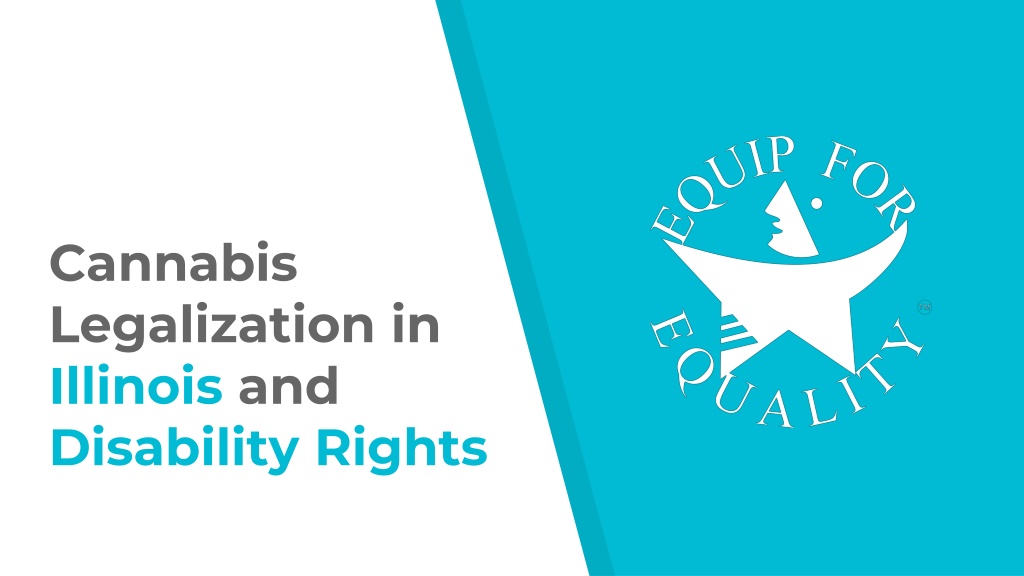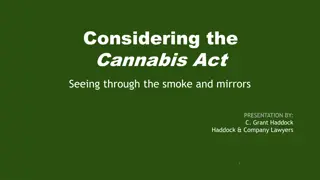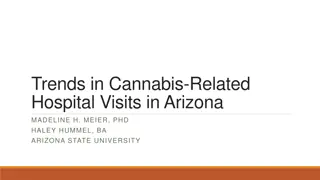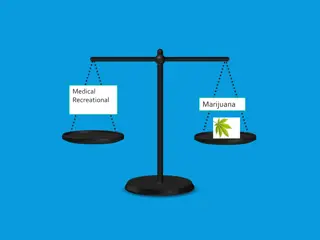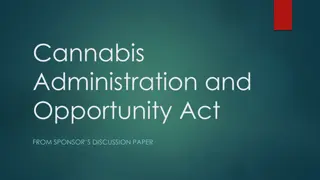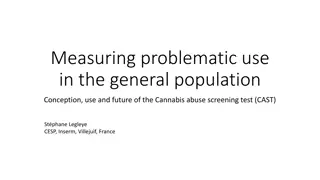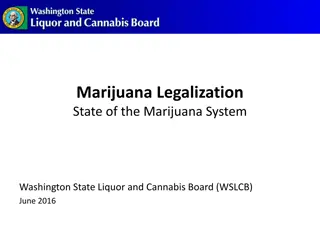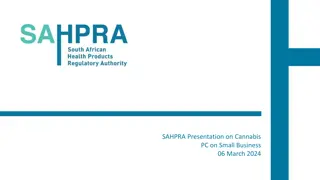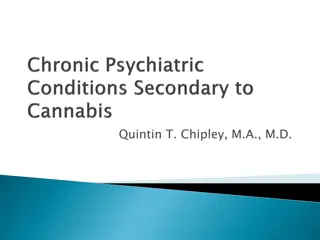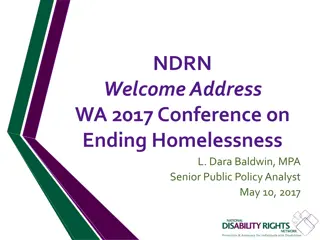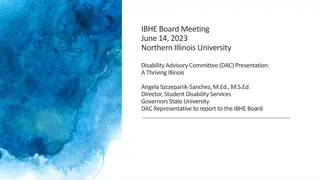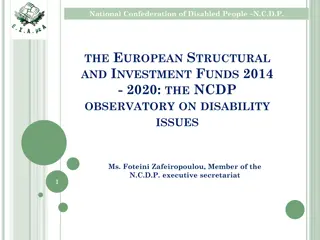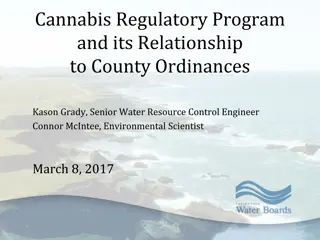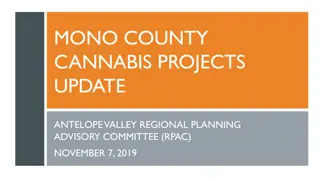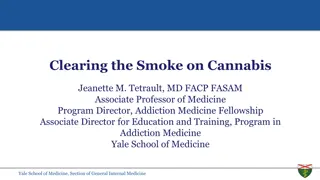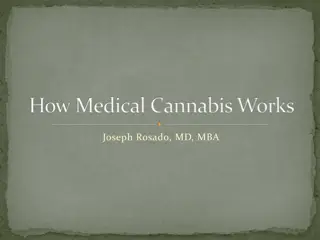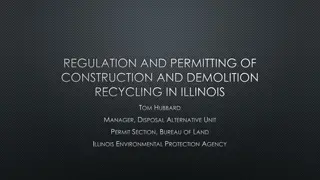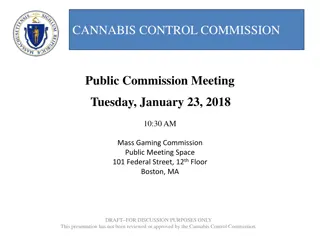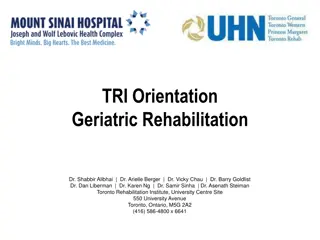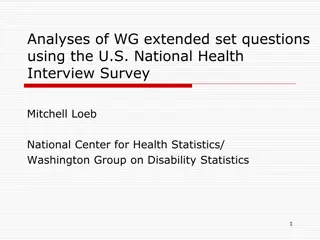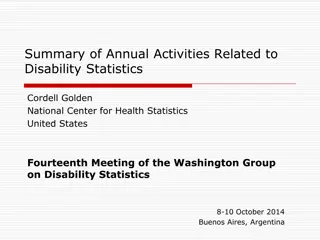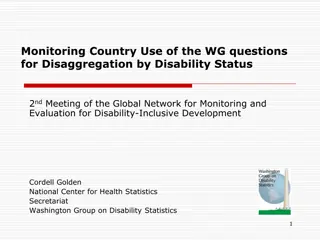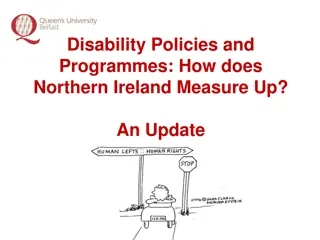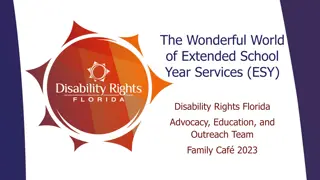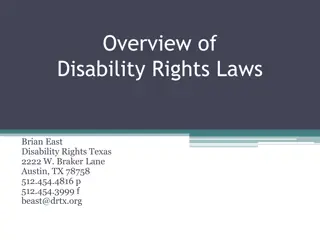Disability Rights and Cannabis Legalization in Illinois
Equip for Equality in Illinois provides free legal assistance to people with disabilities, addressing issues related to disability, employment rights, and relevant laws such as the Americans with Disabilities Act. The organization's Employment Rights Helpline supports job seekers and employees with disabilities in understanding their rights and obtaining accommodations. Today's session covers laws like the ADA, Fair Housing Act, and Compassionate Use of Cannabis Program Act.
Download Presentation

Please find below an Image/Link to download the presentation.
The content on the website is provided AS IS for your information and personal use only. It may not be sold, licensed, or shared on other websites without obtaining consent from the author. Download presentation by click this link. If you encounter any issues during the download, it is possible that the publisher has removed the file from their server.
E N D
Presentation Transcript
Cannabis Legalization in Illinois and Disability Rights
Equip For Equality Protection and advocacy (P&A) system for the State of Illinois Mission: Advance the human & civil rights of people with disabilities in Illinois Free legal assistance for people with disabilities about issues related to their disability Legal teams: Civil Rights, Special Education, Abuse Investigations Voice: 800.537.2632 TTY: 800.610.2779 www.equipforequality.org 2
Employment Rights Helpline For job seekers and employees with disabilities Helpline staff can: Discuss employee rights under the ADA Answer employment rights questions Assist with reasonable accommodations Help callers understand their options Share fact sheets, sample letters and forms Give referrals and other assistance as needed Voice: 844.744.4879 TTY:800.610.2779 www.equipforequality.org/employment employment@equipforequality.org 3
Todays Session Overview of Relevant Laws Americans with Disabilities Act Federal Fair Housing Act Illinois Human Rights Act Compassionate Use of Cannabis Program Act Questions 4
Americans with Disabilities Act Federal civil rights law Title I: Employment Title II: Public entities Title III: Private businesses Does not apply to private, multi-family housing Has non-discrimination and more proactive requirements reasonable accommodations 5
Americans with Disabilities Act Who is protected? Actual Disability An individual who has an impairment that substantially limits a major life activity Record of Record of or history of an actual disability Regarded As Perceived to have an impairment Association Association with a person with a disability 6
Americans with Disabilities Act Who is not protected? An individual who is currently engaging in the illegal use of drugs, when the covered entity acts on the basis of such use Whether a substance is illegal depends on whether it is illegal as defined by the federal Controlled Substances Act (CSA). CSA: Marijuana is an illegal controlled substance with no exception for medicinal use Result: Courts uniformly hold that the ADA does not protect people who currently use marijuana 7
What does currently engaging mean? If an individual fails a drug test, courts easily reach the conclusion that they are currently engaged in the use of illegal drugs See, e.g., Daniels v. City of Tampa, 2010 WL 1837796 (M.D. Fla. Apr. 12, 2010) (finding the plaintiff to be currently engaged in the illegal use of drugs when the plaintiff was involved in a vehicle accident and the required post-accident drug/alcohol test was positive for cocaine) 8
What does currently engaging mean? More complicated question: How long does an individual have to be drug-free to no longer be considered currently engaging in the illegal use of drugs? No categorical rules Courts/EEOC: An applicant s or employee s drug use is current if it occurred recently enough to justify an employer s reasonable belief that the individual s involvement with drugs is an ongoing problem. 9
What does currently engaging mean? Suarez v. Penn. Hosp. of Univ. of Penn. Health Sys. 2018 WL 6249711 (E.D. Pa. Nov. 29, 2018) 5.5 months after completing 29 days of intensive inpatient treatment, nurse was fired from her job Employer: Drug use was recent enough to justify belief that her usage was an ongoing problem Court: Not currently engaging; covered by ADA When nurse was discharged from treatment program, it was recommended that she return to the practice of nursing two weeks after the date of her 10
The ADA does apply in the following situations Individual successfully completed a supervised drug rehabilitation program and is no longer engaging in the illegal use of drugs or has otherwise been rehabilitated successfully and is no longer engaging in such use. Individual is participating in a supervised rehabilitation program and is no longer engaging in such use Individual is erroneously regarded as engaging in such use, but is not engaging in such use Entity does not act on the basis of drug-use 11
The ADA does apply in the following situations EEOC v. Pines of Clarkston 2015 WL 1951945 (E.D. Mich. Apr. 29, 2015) Employee with epilepsy who used medical marijuana was fired Employer: Used illegal drugs no ADA protections Employee: Not true. Really fired due to epilepsy Court: Jury could find reason was pretextual Employee was grilled about her epilepsy - told that the position would be too stressful for her based on her medical condition 12
Does the ADA apply? John has a history of drug addiction, including cannabis. He participated in a drug rehabilitation program and has not used cannabis in nine months. He is not hired for a job because of concerns that he will begin using cannabis again. 13
Does the ADA apply? Jake previously smoked marijuana socially, but hasn t done so in nine months. He is not hired for a job because of concerns that he will begin using cannabis again. 14
Does the ADA apply? Cynthia lives in Illinois. She has a medical marijuana card and uses marijuana in the evenings to treat her PTSD. She is given a job offer, but then fails a drug test based on her marijuana use. 15
Does the ADA apply? Jose spends significant time outside of his job with a group of co- workers. His friends all tested positive for marijuana. Jose s boss sees him outside in the parking lot with these friends, concludes that he also uses cannabis and fires him. 16
Does the ADA apply? Natalie s son has had treatment for substance abuse in the past. Natalie is applying for new jobs and, after her prospective employer learns this information, Natalie is not hired. 17
Disability-Inquiries & Medical Exams The ADA prohibits employers from certain disability- related inquiries and medical exams Rules differ based on stage of employment Pre-employment Post-conditional job offer Current employees Tests for illegal use of drugs are not medical exams so can be conducted at any stage of employment Inquiries about drug use Current use = OK under the ADA Past use = Not OK if questions get at addiction 18
Public Entities & Private Businesses Titles II and III do not prohibit discrimination against current users of illegal drugs, except: Public entities and places of public accommodation cannot deny someone access to health services or services connected with drug rehabilitation on the basis of illegal drug use 19
Federal Fair Housing Act Disability does not include current, illegal use or addiction to a control substance, as defined by CSA Not a large body of case law about this definition or whether permitting medical marijuana is a reasonable modification See Forest City Residential Mgmt., Inc. ex rel. Plymouth Square Ltd. Dividend Hous. Ass'n v. Beasley, 71 F. Supp. 3d 715 (E.D. Mich. 2014) (Fair Housing Act did not require apartment manager to accommodate disabled tenant s medical marijuana use in publicly funded housing). 20
State laws Illinois Human Rights Act Compassionate Use of Medical Cannabis Program Act 21
Illinois Human Rights Act Protects people from disparate treatment and requires reasonable accommodations Disability does not include an employee currently engaging in the illegal use of drugs. 775 ILCS 2-104(C)(1). An employer may prohibit the illegal use of drugs and the use of alcohol at the workplace by all employees. 775 ILCS 5/2-104(C)(3)(a). No published cases involving cannabis from state court (yet) 22
Recent case in the Illinois Human Rights Commission In the Matter of the Request for Review by: Craig Miller, Petitioner 2020 WL 719967 (IHRC Feb. 11, 2020) Employee failed drug test based on medical marijuana use; ultimately fired Commission denied request for review The Employer is within its rights to establish a zero-tolerance policy, medical marijuana prescription or not Cited Compassionate Use Act 23
Hope for success in state court? Court decisions outside of Illinois Callaghan v. Darlington Fabrics 2017 WL 2321181 (R.I. Super. May 23, 2017) Applicant not hired due to medical marijuana use Court: Stated a claim under Rhode Island anti- discrimination law Employer should have engaged in the interactive process to determine if reasonable accommodations were available 24
Hope for success in state court? Court decisions outside of Illinois Barbuto v. Advantage Sales and Marketing 477 Mass. 456 (July 17, 2017) Plaintiff with Crohn s disease used medical marijuana legally, but denied employment after failing drug test MA Supreme Court: Found for EE (reversed MTD) Viable claim under MA anti-discrimination law Rejected argument that medical marijuana use is per se unreasonable because marijuana is a federal crime Permitting off-site use of medical marijuana may be reasonable or unreasonable (safety, statutory obligation, etc.) 25
Illinois Compassionate Use of Medical Cannabis Program Act Anti-discrimination requirements: No school, employer, or landlord may refuse to enroll or lease to, or otherwise penalize, a person solely for his or her status as a registered qualifying patient or a registered designated caregiver, unless failing to do so would put the school, employer, or landlord in violation of federal law or unless failing to do so would cause it to lose a monetary or licensing- related benefit under federal law or rules. This does not prevent a landlord from prohibiting the smoking of cannabis on the premises. 410 ILCS 130/40)(a)(1) 26
Illinois Compassionate Use of Medical Cannabis Program Act But employers are expressly permitted to: Enforce a policy concerning drug testing, zero- tolerance, or a drug free workplace if the policy is applied equally to everyone Discipline for violating a workplace drug policy Discipline for failing a drug test, if failing to discipline would result in the employer violating federal law or cause it to lose a federal contract or funding Unclear if there is a private right of action 410 ILCS 130/50 27
Hope from other states? State medical marijuana laws Whitmire v. Wal-Mart Stores, Inc. 359 F.Supp.3d 761 (D. Ariz. 2019) Customer Service Supervisor held a medical marijuana card to treat chronic pain Given drug test after workplace accident Tested positive & fired Claims under state laws, including Arizona Medical Marijuana Act AMMA prohibits employment discrimination Exception if employee uses, possesses, or is impaired on employer s premises or during work hours 28
Whitmire continued AZ law: Impairment can t be based only on presence of metabolites of marijuana in insufficient concentration to cause impairment Here, no expert testimony about concentration level Wal-Mart moved for summary judgment good faith belief of impairment Court: Granted summary judgment to employee sua sponte Firing a registered qualifying patient who tests positive regardless of marijuana concentration is a bright line disregard of state law Test itself insufficient without expert testimony 29
Court decisions outside of Illinois Callaghan v. Darlington Fabrics 2017 WL 2321181 (R.I. Super. May 23, 2017) Applicant also brought a claim that employer violated state medical marijuana law Court: Granted summary judgment to employee Implied right of action Discrimination on the basis of status of a medical marijuana card holder protected use, too No issue of preemption laws have different purposes 30
Other state medical marijuana laws Some courts have held that state medical marijuana laws are not preempted by the ADA or the CSA Chance v. Kraft Heinz Foods, 2018 WL 6655670 (Del. Super. Ct. Dec. 17, 2018) (finding Delaware state law had a private right of action and was not preempted) Noffsinger v. SSC Niantic Operating Co. LLC, 273 F.Supp.3d 326 (D. Conn. 2017) (after job offer rescinded for applicant with PTSD due to med marijuana, court found the ADA does not preempt state medical marijuana law) 31
Pro-employer decisions Garcia v. Tractor Supply Co., 154 F.Supp.3d 1225 (D.N.M. 2016): New Mexico s medical marijuana and civil rights laws do not require an employer to accommodate medical marijuana Curry v. MillerCoors, 2013 WL 4494307 (D.Colo. Aug. 21, 2013): [D]ischarging an employee under these circumstances is lawful, regardless of whether the employee consumed marijuana on a medical recommendation, at home or off work 32
Pro-employer decisions Roe v. TeleTech Customer Care Mgmt (Colorado) LLC, 171 Wash. 2d 736 (2011): Washington law does not protect an employee from being discharged because of authorized medical marijuana use Casias v. Wal-Mart Stores, 764 F.Supp.2d 914 (W.D. Mich. 2011): Michigan law does not regulate private employment 33
Take-aways and Resources Important to educate cannabis-users about what law does and does not do Advocate for stronger anti-discrimination protections at the federal and state level ADA Legal Brief and Webinar: Drugs, Alcohol and Conduct Rules (EFE, Jan. 2020) www.accessibilityonline.org/ada- legal/archives/110778 EFE Fact Sheet: Cannabis/Marijuana in the Workplace: www.equipforequality.org/marijuana/ 34
Questions? Barry C. Taylor barryt@equipforequality.org 312.895.7317 Rachel M. Weisberg rachelw@equipforequality.org 312.895.7319 35
